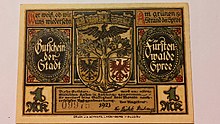Nicolaus von Minckwitz
Nicolaus von Minckwitz , also: Nikolaus von Minckwitz and Nickel von Minckwitz (* around 1485 ; † 1549 ) was a German knight of the Renaissance, from the Saxon noble family of those von Minckwitz . He was also known as a promoter of the Reformation .
Life
Nickel was u. a. Lord of Sonnewalde Castle and also Governor of Lusatia . As a cosmopolitan, studied lawyer (Universities in Paris, Padua, Geneva and Prague) and personal friend of Martin Luther, he set in 1522, together with his brothers Georg and Kaspar von Minckwitz, who lived at the Drehna and Trebsen castles, in accordance with modern ideas of the Renaissance, evangelical-Lutheran pastors on their lands. 1530 followed by a separate Lutheran church order.
In 1528 there was an initially legal dispute with the Catholic Bishop of Lebus, Georg von Blumenthal in Fürstenwalde. (The denomination is worth mentioning because it probably contributed to the feud in the context of the strong dislike of the Catholic Church at the time for the reform proposals of Martin Luther and his supporters.)
The Lutheran (sic!) Heinrich von Queiß auf Plössin (now Blossin ) filed a complaint about arson by a shepherd with the responsible Catholic Bishop of Lebus , Blumenthal. According to Queiß, the bishop dealt with this process too negligently, especially since nothing was done to arrest the shepherd who was plundering him and to avert the danger. Queiß therefore asked his influential friends Nickel von Minckwitz and Otto von Schlieben for help, who in turn approached the Elector of Brandenburg Joachim I Nestor in this matter and complained about the negligent conduct of the bishop's office.
As a result, the very proud but less industrious bishop felt ignored and continued to delay his official duties several times, arbitrarily, so that the situation finally escalated. According to the law of the time, the feud was declared to the bishop and on the night of July 8th to 9th, 1528, Nickel von Minckwitz besieged the episcopal residence town of Fürstenwalde . He took over the city with his troops, whereby the cathedral, the episcopal buildings and some town houses were affected according to the customs of the time, people were not harmed according to the reports. The cathedral treasure was not touched by Nickel von Minckwitz.
A pretty diorama in the Fürstenwalde town museum shows the handover of the keys by the town councilors to Nicolaus von Minckwitz.
Bishop Georg von Blumenthal managed to flee from Fürstenwalde to Grimnitz (today Joachimsthal), where the Brandenburg elector was staying. The strictly Catholic Elector Joachim I condemned the Minckwitz feud against the bishop, as well as Martin Luther .
Joachim I now felt compelled in turn an army set up and managed in addition, to nickel of Minckwitz the imperial ban to be imposed. But both sides avoided the fight. A few years later, Nickel was able to achieve the repeal of the imperial ban with his formal declaration of submission to the elector. This was then celebrated extensively at the invitation of the Elector in the Castle of Cölln on the Spree (today's Berlin City Palace). From the festivities of the time, the elector's question to Nickel is still handed down, what would he have done with the bishop if he had got hold of him? Traditional answer: "... testiculos ipsem amputasset" ... (not guaranteed!) The bishop was transferred to Ratzeburg shortly afterwards.
The feud of the knight Nickel von Minckwitz against the Bishop of Lebus was thus an early example of legal history in Germany and literarily worked on by Theodor Fontane .
literature
- Florian Wilke: Bishop's residence in Fürstenwalde / Spree . Fürstenwalde 1993.
- Georg FG Goltz: Diplomatic Chronicle Fürstenwalde . Fürstenwalde 1837.
- Günther H. Wiege: Nickel from Minckwitz . 1999.
- Ralf Gebuhr: Nickel von Minckwitz and early modern palace construction in Lower Lusatia . In: Military and Society in the Early Modern Times , Bulletin 5, 2002, pp. 61–67.
- Ingo Materna, Wolfgang Ribbe , Kurt Adamy: Brandenburg history . Berlin 1995, T.2, p. 263.
- Siegmund Wilhelm Wohlbrück: History of the former diocese of Lebus and the country of this name . Berlin 1829, p. 272ff.
Web links
- opus.kobv.de (PDF; 32 kB)
Individual evidence
- ^ Ingo Materna, Wolfgang Ribbe, Kurt Adamy: Brandenburg history. Akademie-Verlag, 1995, ISBN 3-05-002508-5 , p. 263, Google book preview
- ^ Theodor Fontane : Walks through the Mark Brandenburg. Fourth part: Spreeland in the Gutenberg-DE project
| personal data | |
|---|---|
| SURNAME | Minckwitz, Nicolaus von |
| ALTERNATIVE NAMES | Minckwitz, Nikolaus von; Minckwitz, nickel from |
| BRIEF DESCRIPTION | German knight of the Renaissance |
| DATE OF BIRTH | around 1485 |
| DATE OF DEATH | 1549 |



